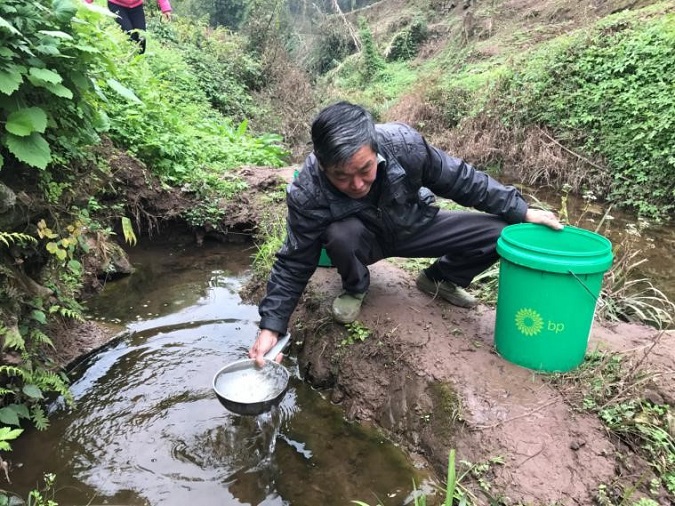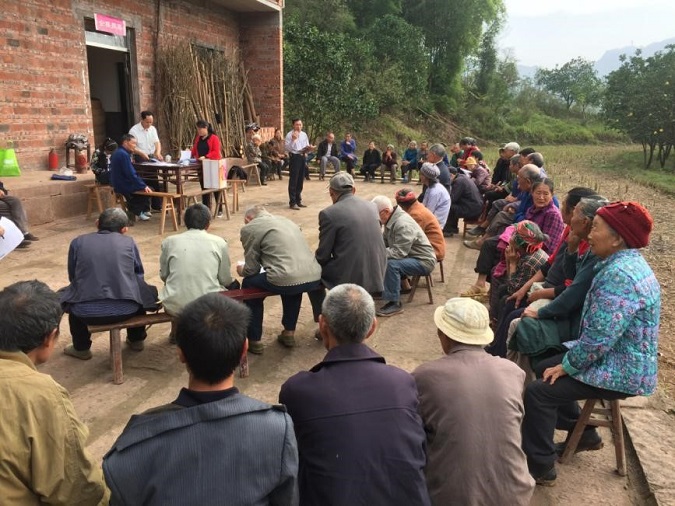Home \ Project News \ Age Does not Bar Those Who Have A Will
In Luojiachang Village, Sanyuan Township nearly 80% to 90% of young people have gone out to work, with each household remaining with one or two old people at home who take care of all the fields and animals. Because of the absence of young people in the village most of our village trainings, meetings and other activities are attended by old people. You can wonder what all these old people could really do!
Zhu Youcai, also called “Uncle Cai,” is one of the left behind elderly and he enrolled as one of the Farmers’ Green Action Group members. He is nearly 61, and stays by himself because his wife went to Fujian to take care of their two grandsons when their parents go to work.
At the beginning of the project, there was a need to organize villagers into Farmers’ Green Action Groups and to select group leaders who could assist in organizing or managing activities to be implemented in the village. Group number 5 was the main group the project was targeting for the improvement of drinking water for both people and livestock. To select a leader for Group 5 certain skills and experience were a requirement because there was an important task of constructing a water tank. Therefore a person with knowledge and experience in construction work was needed so that he could be able to supervise the construction process and check on the progress.
After holding a couple of meetings with the villagers Uncle Cai stood up and declared that he was willing to take up the responsibility of leading the group. He went on to explain that he had once worked at some construction sites and had experience in the handling of reinforced steel bars. Later we were to realize that Uncle Cai’s experience played a vital role in the quality supervision on the construction of the water pool. He knew the proportion and thickness of the concrete, the amount and standard usage of reinforced steel bars and how to verify the thickness and length of the water pipes, thus ensuring that each link was completed as per the specified quality and quantity. As a leader he was able to mobilize other villagers to actively participate in the construction of the water tank.
Before the Project was launched in Luojiahang Village, many households were troubled by the dry season spell and the majority of farmers like Uncle Cai had to go a long distance to fetch water from the pond which was not so clean.
The first time we visited Uncle Cai, he was fetching water from a water pond. All the water he used at his home came from this water pond. During the rainy season the pond would be turned into mud and the flood water would overflow the water pond. On such days he and the other nearby villagers could do nothing but to fetch their drinking water from the river. Water was the problem the whole neighbourhood faced. Now the drinking water tank which was constructed under the support of Kadoorie Charitable Foundation had solved their problem of drinking water. His experience and knowledge about construction and also his willingness to assist the project also turned out for the best. The villagers and their descendants will benefit from the drinking water tank. No longer will they walk long distances to fetch water now that the water pipes have been connected to their homes. Since the Project has solved the problem of drinking water the farmers have become positive and they participate actively in all the project activities.
Our concept as Humana People to People is to enable the community to develop independently. We hope that the farmers through their participation in different project activities develop a sense of ownership and that everything that they do brings sustainable development within the community. What the Project Team does is to work together with the community in identifying possible solutions, possible actions and possible people to make things happen. By integrating the possible resources good and tangible results are then achieved. Uncle Cai can be regarded as such kind of a resource considering his capability of supervising the construction of the drinking water tank and guaranteeing its successful construction and quality. Old people like Uncle Cai can be considered as a strong pillar in the community because he has a strong will to see things happen. The farmers through their work in helping during the construction process also prove that they are united in striving for development. Also during the meetings which were held after the construction the farmers together formulated the standards and principles of the water charges and they also selected those who would be responsible for the management of the water tank.
The farmers in Sanyuan are also involved in different activities organized by the project. They have been trained on how to plant broad beans as an initiative to develop green manure. 250 farmers were mobilized to plant the broad beans and they planted a total of 151 mu. After harvest they covered the broad beans residues with soil to turn them into organic manure. The project also managed to give different trainings to the farmers on environmental protection - such as how to improve soil fertility by using green manure and mulching, how to protect drinking water and water borne diseases and sustainable agricultural techniques such as intercropping and crop rotation. From these trainings the farmers have improved their productions and also their capacity.
Brief summary of the project:
Farmers’ Green Action Club Approach to Agriculture, Water and Hygiene Improvement is a 3 year program. The project started on the 1st of August 2016 and will end on 31st of July 2019. The project objectives are: To reduce poverty through increase of skills; production and improved access to markets; to protect the planet by promoting sustainable agriculture and improving water management; to improve sanitation; hygiene, nutrition and health conditions in the rural communities and to improve construction of local infrastructure and living conditions. To achieve its objectives 1 Farmers’ Green Action Instructor (FGA Instructor) was recruited and mobilization of farmers was done. Through this mobilization 6 Farmers’ Green Action Clubs (FGA Clubs)were established, organized from the 250 member households. Club committees were selected among these club members. The Project Leader gives weekly training to the FGA Instructor, comprising of agricultural knowledge and skills, environmental education, health, nutrition and sanitation. The FGA Instructor and the Humana People to People Project Leader together gives training to the FGA Club Committees on a monthly basis. The FGA Instructor trains the FGA Club members on a weekly basis.

Water was a big problem for the farmers as they were forced to fetch their drinking water from an open pond.

Most of the young people have left the villages and mostly it is the old who are left behind to take care of the land. The Farming Instructor trains these elderly on how to use sustainable agricultural techniques to improve their productions.

After construction of the water tank, pipes were connected to each household.
The project is supported by the Kadoorie Charitable Foundation.
Content in this article reflects the views of the authors and not necessarily those of the funder.